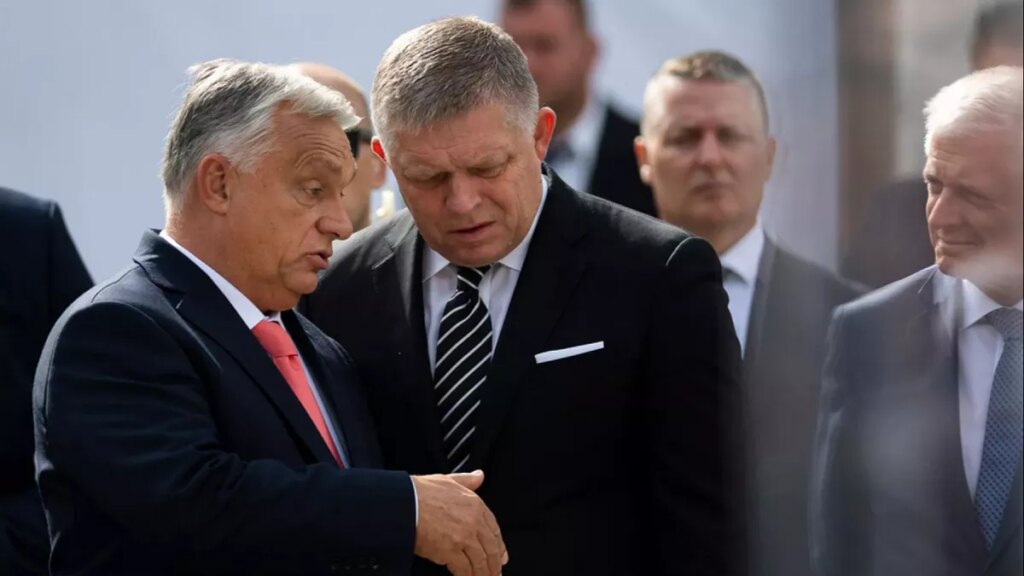Hungarian Prime Minister Viktor Orbán and Slovakian Prime Minister Robert Fico have vocally criticized the European Union’s (EU) strategies regarding energy relations with Russia, particularly in the context of the ongoing war in Ukraine. Their remarks came during the 130th anniversary celebration of the Mária Valéria Bridge, which connects Slovakia and Hungary. Both leaders are among the few in the EU who continue to support energy ties with Moscow, highlighting the economic implications and security concerns associated with a complete withdrawal from Russian oil and gas.
| Article Subheadings |
|---|
| 1) Context of Energy Relations |
| 2) Response from Orbán and Fico |
| 3) Economic Implications |
| 4) EU’s Stance and Policy Changes |
| 5) Future Developments and Reactions |
Context of Energy Relations
Energy relations between the EU and Russia have come under intense scrutiny since the onset of the war in Ukraine in February 2022. The European Union has accelerated its efforts to sever economic ties with Moscow, particularly in the energy sector. Hungary and Slovakia, on the other hand, continue to import Russian oil and gas, arguing that abrupt changes could jeopardize their energy security. The geographical and infrastructural realities of both countries contribute significantly to this dependence. Officials assert that without viable alternatives in place, transitioning away from Russian sources is not feasible.
Response from Orbán and Fico
During their speeches at the celebration marking the bridge’s anniversary, both Orbán and Fico expressed strong opposition to EU policies that threaten their energy imports from Russia.
“No one should tell us where to buy oil and gas from,”
said Fico, emphasizing the prerogative of sovereign nations to decide their energy mixes according to international laws. Orbán echoed this sentiment by asserting that the EU has become a “war project” and that its approach to energy policy necessitated a reevaluation of their sovereignty. Their combined statements illustrate a coherent resistance to what they perceive as external pressures from Brussels that undermine national autonomy.
Economic Implications
Both leaders argue that the swift phasing out of Russian oil and gas will bring extreme economic hardships to their countries. Their stances are rooted in the recognition that many industries, from manufacturing to retail, depend heavily on affordable energy supplies.
“The ideological decision to cut off Europe from Russian oil and gas will not only harm Hungary and Slovakia the most, but will significantly damage the entire European Union,”
Fico warned. This perspective is particularly relevant as both nations face the brunt of rising energy costs, which could lead to inflation and deeper economic crises if alternatives are not provided in a timely fashion.
EU’s Stance and Policy Changes
The European Commission is under increasing pressure from several fronts, including U.S. officials, to implement tougher sanctions against Russian energy imports. Recently, the Commission unveiled plans to institute new tariffs on Russian oil that continues to flow into countries like Hungary and Slovakia. Tensions are rising as the EU grapples with how to balance member states’ individual energy needs with its collective goal of reducing dependence on Moscow. This multifaceted dilemma has led Hungary and Slovakia to be positioned as key players in the EU’s energy debate, as their actions could significantly affect the bloc’s overall energy strategy.
Future Developments and Reactions
The coming weeks are likely to see intensified political maneuvering as both Hungary and Slovakia hold on to their energy relationships with Russia despite mounting pressures. U.S. President Donald Trump has called on NATO members, including Hungary, to cease purchasing Russian oil entirely. However, both Orbán and Fico remain steadfast in their positions, concerned that their nations’ economic stability could be compromised. Critics argue that their continued support for Russia may be a strategy to solidify their domestic authority rather than a genuine commitment to national interest. As the broader European landscape evolves, the implications of their stances will likely resonate throughout the EU, influencing policy discussions and international relations.
| No. | Key Points |
|---|---|
| 1 | Orbán and Fico express strong resistance to the EU’s energy policies. |
| 2 | Mention of significant economic implications for Hungary and Slovakia. |
| 3 | Both leaders call for sovereignty in deciding energy sources. |
| 4 | EU faces pressure from the U.S. to implement tougher sanctions. |
| 5 | Future developments will shape the EU’s overall energy strategy. |
Summary
The ongoing energy reliance of Hungary and Slovakia on Russian oil and gas presents a complex web of economic, geopolitical, and social factors that will be critical in shaping the EU’s future energy policies. The dissenting views expressed by Orbán and Fico underline the struggle between national interests and collective EU security measures in the wake of the Russia-Ukraine conflict. As the situation evolves, the reactions of both leaders will likely influence not only their nations but also the broader European landscape.
Frequently Asked Questions
Question: Why are Hungary and Slovakia continuing to purchase Russian oil and gas?
Hungary and Slovakia maintain that geographical and infrastructural constraints make it nearly impossible to transition away from Russian energy supplies without significant economic repercussions.
Question: What are the main criticisms of Orbán and Fico’s stance?
Critics argue that their pro-Kremlin policies are a means to strengthen their domestic authority while undermining the EU’s unified approach to countering Russia’s actions in Ukraine.
Question: How is the EU responding to pressure from the U.S. regarding Russian oil?
The European Commission is developing plans to impose tariffs on Russian oil imports, particularly targeting countries like Hungary and Slovakia that continue to purchase these resources.


